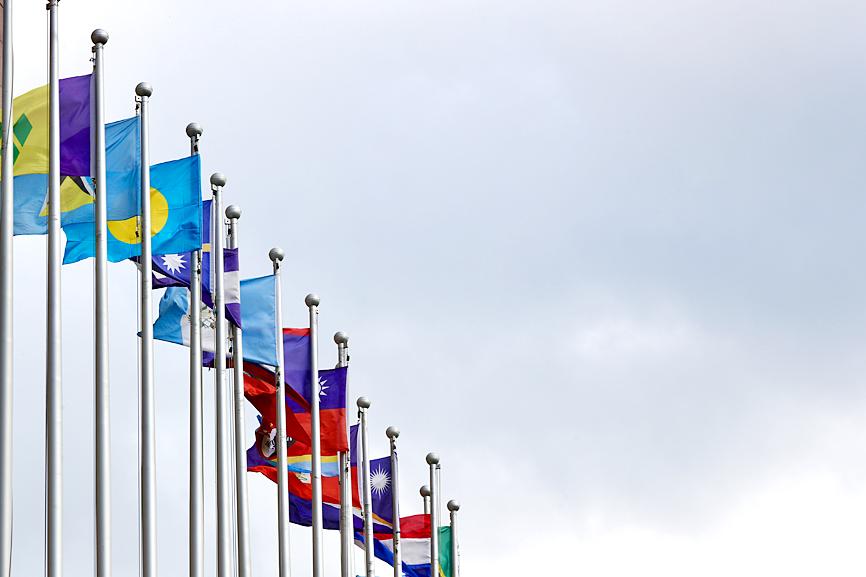Taiwan severed diplomatic ties with Nicaragua shortly after the Central American nation on Thursday switched recognition to China, the Ministry of Foreign Affairs said yesterday.
Taiwan recalled staff from its embassy and technical mission after Nicaraguan President Daniel Ortega’s administration announced that it would only recognize China, the ministry said.
“The People’s Republic of China [PRC] is the only legitimate government that represents all China, and Taiwan is an inalienable part of the Chinese territory,” the Nicaraguan government said in a statement. “As of today, Nicaragua breaks its diplomatic relations with Taiwan and ceases to have any official contact or relationship.”

Photo: Ritchie B. Tongo, EPA-EFE
Although Nicaragua’s diplomatic switch leaves Taiwan with just 14 diplomatic allies, it comes as Taipei bolsters ties with multiple unofficial Western friends, including the US.
The ministry said that Taiwan “deeply regrets” that the Nicaraguan government has disregarded the friendship between Taiwanese and Nicaraguans.
“To safeguard national sovereignty and dignity, Taiwan has decided to terminate diplomatic relations with Nicaragua with immediate effect, end all bilateral cooperation projects and aid programs, and recall staff of its embassy and technical mission in Nicaragua,” it said.
The ministry also expressed “strong condemnation” of Beijing, saying China had forced Taiwan’s ally to switch allegiance in an attempt to squeeze Taipei’s international space.
“The people of Taiwan will not cave to China’s pressure,” it said.
The ministry added that Taiwan was not part of the PRC, which has never ruled over Taiwan.
President Tsai Ing-wen (蔡英文) said that despite Nicaragua’s decision, Taiwan would not abdicate its responsibilities as a member of the international democratic community.
“The more successful Taiwan’s democracy, and the greater the international support, then the greater the pressure from the authoritarian camp,” Tsai said. “Whether it’s diplomatic pressure or military intimidation, we will not change our determination to adhere to democracy and freedom, to go on the international stage and participate.”
Chinese Ministry of Foreign Affairs spokesman Wang Wenbin (汪文斌) said there was no “economic preconditions” to establishing ties, adding that it was “a policy decision, and definitely not a trading of bargaining chips.”
This is the second time that Nicaragua has cut ties with Taiwan under Ortega.
In 1985, Ortega’s government ended 55 years of formal relations with Taiwan and switched recognition to China.
After Violeta Barrios Torres de Chamorro replaced him as president in 1990, ties with Taiwan resumed, subsequently being maintained by Ortega after he returned to office in 2007.
In Taipei, the Ministry of Education said it would provide necessary support and assistance to the 143 Nicaraguan students living in Taiwan who wish to continue their studies here.
There are no Taiwanese nationals studying in Nicaragua, it added.
Since May 2016, when Tsai came to office, Taiwan has lost eight diplomatic allies: Burkina Faso, the Dominican Republic, El Salvador, Kiribati, Nicaragua, Panama, Sao Tome and Principe, and the Solomon Islands.

INVESTIGATION: The case is the latest instance of a DPP figure being implicated in an espionage network accused of allegedly leaking information to Chinese intelligence Democratic Progressive Party (DPP) member Ho Jen-chieh (何仁傑) was detained and held incommunicado yesterday on suspicion of spying for China during his tenure as assistant to then-minister of foreign affairs Joseph Wu (吳釗燮). The Taipei District Prosecutors’ Office said Ho was implicated during its investigation into alleged spying activities by former Presidential Office consultant Wu Shang-yu (吳尚雨). Prosecutors said there is reason to believe Ho breached the National Security Act (國家安全法) by leaking classified Ministry of Foreign Affairs information to Chinese intelligence. Following interrogation, prosecutors petitioned the Taipei District Court to detain Ho, citing concerns over potential collusion or tampering of evidence. The

NEGOTIATIONS: Taiwan has good relations with Washington and the outlook for the negotiations looks promising, Minister of Economic Affairs J.W. Kuo said Taiwan’s GDP growth this year is expected to decrease by 0.43 to 1.61 percentage points due to the effects of US tariffs, National Development Council (NDC) Minister Paul Liu (劉鏡清) said at a meeting of the legislature’s Economics Committee in Taipei yesterday, citing a preliminary estimate by a private research institution. Taiwan’s economy would be significantly affected by the 32 percent “reciprocal” tariffs slapped by the US, which took effect yesterday, Liu said, adding that GDP growth could fall below 3 percent and potentially even dip below 2 percent to 1.53 percent this year. The council has commissioned another institution

NEGOTIATIONS: The US response to the countermeasures and plans Taiwan presented has been positive, including boosting procurement and investment, the president said Taiwan is included in the first group for trade negotiations with the US, President William Lai (賴清德) said yesterday, as he seeks to shield Taiwanese exporters from a 32 percent tariff. In Washington, US Trade Representative Jamieson Greer said in an interview on Fox News on Thursday that he would speak to his Taiwanese and Israeli counterparts yesterday about tariffs after holding a long discussion with the Vietnamese earlier. US President Donald Trump on Wednesday postponed punishing levies on multiple trade partners, including Taiwan, for three months after trillions of US dollars were wiped off global markets. He has maintained a 10 percent

TRADE: The premier pledged safeguards on ‘Made in Taiwan’ labeling, anti-dumping measures and stricter export controls to strengthen its position in trade talks Products labeled “made in Taiwan” must be genuinely made in Taiwan, Premier Cho Jung-tai (卓榮泰) said yesterday, vowing to enforce strict safeguards against “origin laundering” and initiate anti-dumping investigations to prevent China dumping its products in Taiwan. Cho made the remarks in a discussion session with representatives from industries in Kaohsiung. In response to the US government’s recent announcement of “reciprocal” tariffs on its trading partners, President William Lai (賴清德) and Cho last week began a series of consultations with industry leaders nationwide to gather feedback and address concerns. Taiwanese and US officials held a videoconference on Friday evening to discuss the